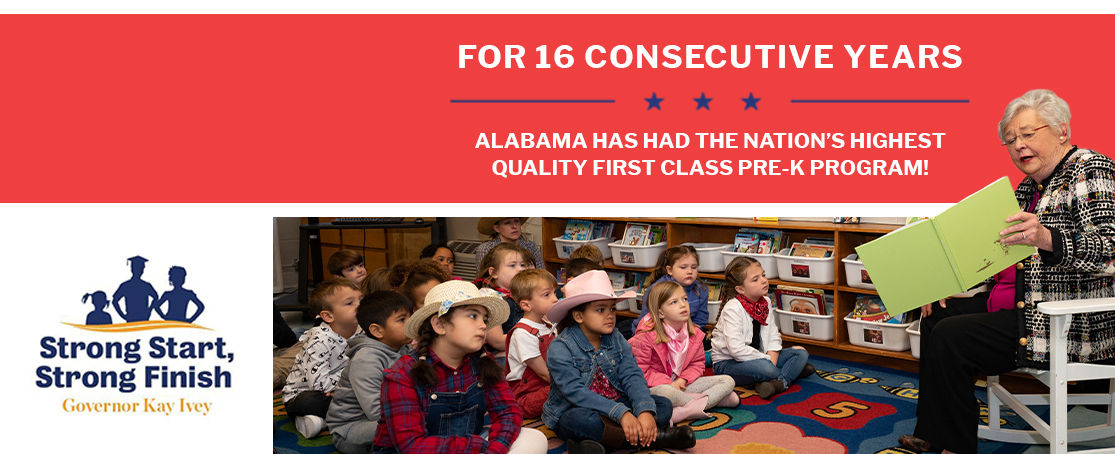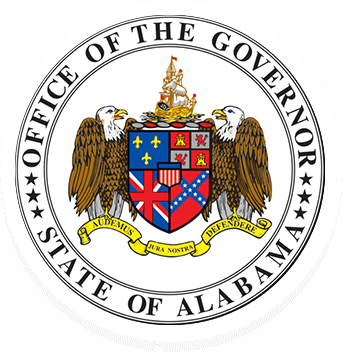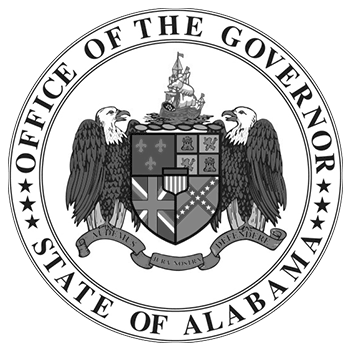Governor Ivey Announces New First Class Pre-K Classrooms, Top NIEER Quality Rating for 16th Consecutive Year

MONTGOMERY — Governor Kay Ivey and the Alabama Department of Early Childhood Education are proud to announce that the nationally recognized, high-quality Alabama First Class Pre-K program will add 96 new classrooms in 35 counties this fall. This is the first round of new classroom funding that will be released by the Alabama Department of Early Childhood Education. Additional classrooms will be funded based on further evaluation of high-needs areas prior to the commencement of the 2022-2023 school year.
New classrooms will expand access to the state funded, voluntary pre-kindergarten program to 26,658 children in the 2022-2023 school year, with more than 1,481 classrooms statewide, moving closer to Alabama’s goal of serving 70 percent of eligible four-year-old children.
Also today, the National Institute for Early Education Research (NIEER) announced that Alabama First Class Pre-K has once again been rated as the nation’s highest quality state pre-kindergarten program for the sixteenth consecutive year.
“Alabama’s First Class Pre-K has once again been recognized as a national model for delivering high-quality early childhood education that gives our youngest citizens a strong start to their educational journey,” said Governor Ivey. “I am glad to see that even more students will have access to pre-K next year and look forward to the day that all Alabama families who want pre-K for their children have access.”
“We are excited to serve an additional 1,728 students in our First Class Pre-K program in the coming year,” said Dr. Barbara Cooper, secretary of Early Childhood Education. “We are thrilled that Governor Ivey and our state leaders continue to invest in early childhood education supporting Alabama First Class Pre-K in maintaining all 10 NIEER quality benchmarks for 16 years running.”
“Leaders across the state recognize the benefits of high-quality pre-K. Thank you to the organizations within the early learning mixed delivery system who have stepped up to partner with us to provide this valuable opportunity in all 67 counties,” she added.
Alabama leads the nation in ensuring pay parity while expanding program access. Alabama’s strong policies result in high-quality learning experiences and teaching. The NIEER State of Preschool Yearbook summarizes progress nationally and state profiling of interstate variation in state pre-K enrollment, spending, and 10 benchmarks that support quality. The 2021 NIEER State of Preschool annual report, based on 2020-2021 academic year data, finds that across the country state funding for pre-school declined 3%. However, this was not the case in Alabama.
The Alabama Legislature approved Governor Ivey’s recommended Fiscal Year 2023 budget increase for the Alabama Department of Early Childhood Education, which includes a $22.5 million increase for the Office of School Readiness that administers First Class Pre-K. In addition to funding new classrooms throughout the state, the Alabama Department of Early Childhood Education will continue to ensure pay parity for all First Class Pre-K teachers with the same pay raise as K-12 public school teachers in the upcoming school year.
The state’s investment in high-quality has led to substantial positive outcomes for children who participate in the program. Alabama First Class Pre-K students are more likely to be proficient in math and reading, with these long-term results holding true even after controlling for student demographics and other variables such as poverty. Alabama has continued to prioritize and strengthen early learning during the pandemic.
More information about First Class Pre-K can be found at: https://children.alabama.gov/first-class-pre-k.
###
Provided by the Office of the Governor of Alabama | governor.alabama.gov

